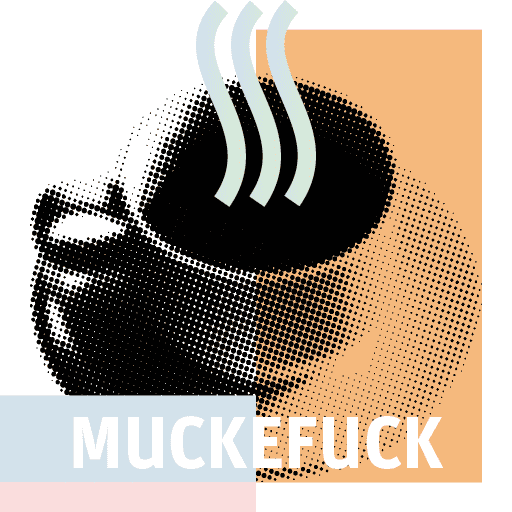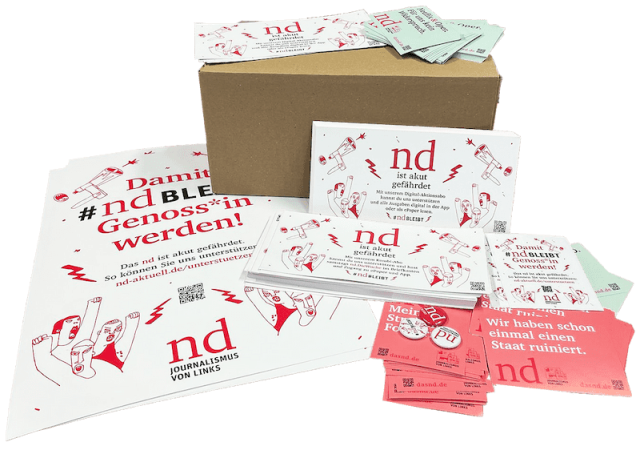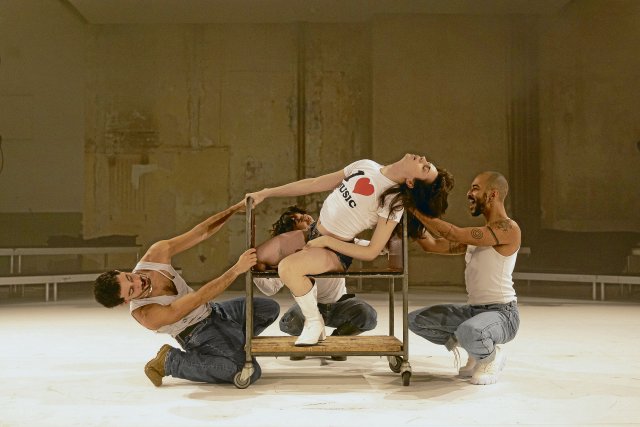Coming from the Berlin ballroom scene: Anh Khoa Trần, Christopher Bullen, Felipe Faria and Púca performing their piece “bodyride”
Photo: Mayra Wallraff
As expected, the audience was also large on the second day of the 33rd Tanztage Berlin festival in the Sophiensaele. While the wedding hall, which has seats on three sides, is sufficient for the first work, the solo “NuReal Dust” (premiere) by Nasheeka Nedsreal, the two group pieces “Glitch Choir” and “bodyride” (premiere) already fill the large ballroom Audience on five sides. As different as the three works are, what they have in common is that the audience always remains visible in the almost arena-shaped performance space. People are together and observe (each other). The performances combine references to club culture and the generous use of smoke machines. Perhaps this is an expression of an awareness of the aerosol saturation of shared analogue spaces that has been sensitized by the pandemic, or perhaps also of an at least temporary need for concealment.
Furthermore, the pieces have in common an artistic authorship that is not only at home in contemporary dance or choreography, but also in various art forms and performance cultures, such as the queer ballroom scene. Images, poses and atmospheres are central; narrative dramaturgy is largely avoided. Even though Nasheeka Nedsreal, masked with a kind of Afrofuturistic facial glasses, often vocally modulates the calls “Time for revolution!” and “This is a call!”, this remains open to interpretation.
The festival takes place in politically oppressive times that insist on clarity and correct positioning. Even against this background, the multi-perspectivity of the stage spaces is legible: there cannot and should not be a single correct position here.
Muckefuck: morning, unfiltered, left

nd.Muckefuck is our newsletter for Berlin in the morning. We walk through the city awake, are there when decisions are made about city politics – but also always with the people who are affected by them. Muckefuck is a coffee length from Berlin – unfiltered and left-wing. Register now and always know what needs to be argued about.
However, the festival for »emerging artists« living in Berlin, which is interested in aesthetic risk, cannot avoid tough selection: out of 240 submitted projects, curator Mateusz Szymanówka was able to select six for a festival premiere and four more as revivals. The situation for dance creators in Berlin was never easy, now it is difficult.
In addition, many transnational or migrant artists in dance – as curator Szymanówka emphasized in his less celebratory than worried opening speech – are really afraid for their future in Germany, in view of the intensified debates about migration policy and the strengthening of right-wing extremist forces in the country. He admits feelings of hopelessness and helplessness, but still calls for us to continue to stand together for difference and against any discrimination. The festival’s first artists do this by opening up spaces that do not give a stage to wars and violence, but rather to vulnerable bodies and their desires.
Nasheeka Nedsreal invites you to explore the “hybrid nature of identity”. Her solo performance combines dance, sounds, video, image projections, language, fabrics and masks, light and fog, perhaps even scent. The material would have been sufficient for a longer work. In various ways she allows first her face, then her head, and finally her entire body to disappear under colorful, glittering, intertwined lengths of fabric. She transforms her (actually beautiful) face in comical and even uncanny ways through absurd grimaces or digital image manipulations – and encourages the audience to try this out too. Nedsreal doesn’t seem to be bothered by the fact that the spectators, who rarely giggle quietly, don’t respond to her speeches and advances; she repeats the question confidently but rather rhetorically: “Do you understand what I’m talking about?” , shaking her blonde braided rastas and plowing through the air with her slender naked arms, in an ecstatic dance she finds a state in which she almost resembles a human helicopter. The flight takes place in her consciousness, she had previously spoken of ghosts and obsessions, twitches, rolls her eyes, as if in a trance. The performance ends, the mystery remains – and the curiosity about further works by the charismatic artist.
The danced choir and vocal performance “Glitch Choir” by Deva Schubert is choreographed around a dirge. It only very subtly quotes the cultural codes of mourning that are common in this country, for example by the two dancers Deva Schubert and Chihiro Araki dripping tears onto each other’s faces with pipettes. Her movement and voice, often seemingly playful and inspiring duet, are the focus. Their two bodies and especially their mouths circle each other, sink into each other, they hold and emphasize each other. Their voices are of astonishing variety: siren-like, beguiling, bubbling, shrieking, moaning. The physical intimacy between the two, which is evident in wrestling-like fights or tender Pietà hugs, is repeatedly expanded by performers who emerge from the audience. They sing as bright as a bell and dance and transform the room into a kind of club for a short time. In the end, eleven people gather on and around a blue carpet to form a community that keeps regrouping and singing a repeating melody with increasing strength, seeming to be waiting for something. On what?
The last performance of the evening, “bodyride,” presents four queer actors from the Berlin ballroom scene: Anh Khoa Trần, Christopher Bullen, Felipe Faria and Púca. The precisely choreographed dance piece initially promises sexy bodies and acrobatic eroticism. Elements of different voguing styles are performed synchronously or solo with serious faces. Only in a few moments is the cool precision broken and the audience smiles offensively and flirtatiously. Púca in particular, who often controls the sound as a DJ, brings humor into the performance, for example driving the three others on a trolley to Madonna’s over 30-year-old hit “Vogue”, which at the same time reminds us of the abyss behind the smile: “You try everything you can to escape / The pain of life that you know … I know a place where you can get away / It’s called a dance floor«. Most of the time, however, the performers relate to each other with looks, poses, touches and in their choreographic sequences. Unlike what is usual during ballroom performances, the audience at Tanztage does not form a familiar community. “What are you looking at?” sings Madonna. Good question.
Almost in applause, Trần, Bullen, Faria and Púca turn to the audience. They read out a statement in English that speaks out against violence, oppression, all forms of discrimination, and also explicitly against anti-Semitism, but emphasize that criticism of the state of Israel should not always be understood as anti-Semitic. In doing so, they are clearly opposing the new anti-discrimination clause of the Berlin Senator for Culture and refer to the open letter to Joe Chialo. The Sophiensaele audience is encouraged to engage in open, fearless dialogue – the applause comes immediately. But the topic remains frightening, and the open, peaceful dialogue is more than challenging for many.
#ndstays – Get active and order a promotional package

Regardless of whether it is pubs, cafés, festivals or other meeting places – we want to become more visible and reach everyone who values independent journalism with an attitude. We have put together a campaign package with stickers, flyers, posters and buttons that you can use to get active and support your newspaper.
To the promotional package
link sbobet judi bola judi bola online judi bola online
